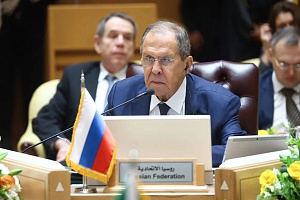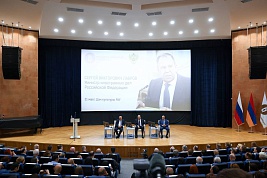Foreign Minister Sergey Lavrov’s address at the 7th ministerial meeting of the Russia-Gulf Cooperation Council Strategic Dialogue, Riyadh, September 9, 2024
Mr Chairman,
Mr Secretary General,
colleagues and friends.
I am glad to have the opportunity to be here on the hospitable Saudi land to hold the 7th ministerial meeting of the Russia-Gulf Cooperation Council Strategic Dialogue. As our chairman said we met in Moscow in 2023.
Riyadh, where the GCC is headquartered, is hosting our event for the third time. The strategic dialogue at the level of foreign ministers was launched 13 years ago. The world has changed a great deal since that time. We can state that the centuries-long hegemony of the West, which the United States and its allies are trying to preserve by all means, is going to be a thing of the past. The outlines of a new, more equitable multipolar international order are gradually emerging, which should be based on the principles of the UN Charter, balance of interests of all countries, both large and small, and also take into account the right of the peoples to determine their destiny by themselves. No doubt that the GCC is becoming a major independent centre in the developing multipolar international order.
The role of the Gulf Cooperation Council will be growing also because of the numerous crises still preserved in the Middle East. There are of conflicts here that pose threats to international peace and security and constrain opportunities for sustainable development in the countries of the region.
At the previous meeting in Moscow, we said that the achievement of genuine stability in the Middle East is impossible without settling the oldest regional problem – the Palestine-Israeli conflict through establishing a Palestinian state in compliance with UN resolutions. Unfortunately, time has once again confirmed that the region just cannot develop stably without resolving this problem.
Since October 2023 the confrontation is undergoing another dramatic escalation. And this time violence has reached unprecedented, really catastrophic dimensions. The number of victims among the peaceful population of the Gaza Strip has already exceeded the total number of the killed and wounded in all previous Arab-Israeli wars.
Together with our Arab friends, GCC countries inclusive, we have succeeded in securing, despite US resistance, the adoption of several Security Council and UN General Assembly resolutions demanding a ceasefire. Our Qatari friends, along with others, have played a key role in the indirect negotiation process between Israel and Hamas to resolve the situation in Gaza. Important decisions on the Palestinian issue were adopted at the end of the extraordinary LAS-OIC summit in Jeddah in November 2023 and the Arab summit meeting in Manama this past May.
Unfortunately, so far, we cannot bring the situation to normal. The inability of the world community to stop hostilities in Gaza and mass deaths of its population has led to a sharp deterioration of the military and political situation in the entire region – from the Lebanese-Israeli border area to the Red Sea.
The confrontation between Israel and Iran has reached a new dangerous level. The Middle East is again on the brink of a big regional war. To prevent it is our common responsibility. We are working on normalising the situation with all sides. We closely coordinate our actions in the United Nations and on other platforms with our friends from the Gulf Cooperation Council.
We expect that today we will be able to discuss these and other international issues on the agenda of our strategic dialogue.
Once again, I thank the presiding officers, the representative of Qatar and Saudi friends for an excellent organisation of our meeting.



